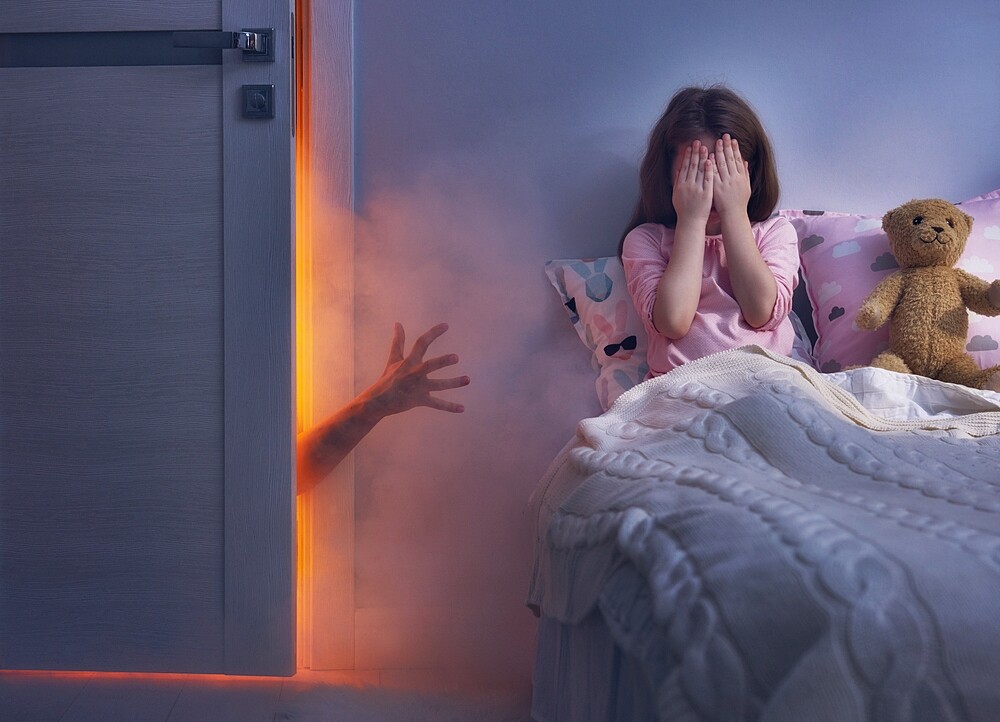The night terror can cause parents to fear for their own child. Here you will learn how a night terror arises and how you should behave.
What is a night terror?
The night terror (Pavor nocturnus) is a form of sleep disorder that occurs in children and often occurs in the first three hours after falling asleep. The child startles, screams, talks to himself, hits and/or kicks around in bed and appears anxious or even panicky. The eyes are often open – which is why parents usually assume that the child is awake. In fact, however, the child actually sleeps during the night terrors, sees through others and is therefore not responsive.
Often the literal nightmare is over after a few minutes, but theoretically it can last up to 40 minutes. If the night terror subsides, the child usually continues to sleep as if nothing had happened – and cannot remember the incident the next morning. Occasionally, the child will also sleepwalk. It is important for parents to know that although the night terror looks bad, it is usually completely harmless for the child and has neither physical nor mental consequences.
When does the night terror occur?
In most cases, children between the ages of three and six experience night terrors, with boys being affected slightly more frequently than girls. The Professional Association of Paediatricians and Youth Doctors estimates that about three to six percent of all children experience a Pavor nocturnus at some time. The phenomenon usually occurs only sporadically. Cases in which the night terror occurs regularly are very rare.
Smaller children and babies can also suffer from night terrors. Sometimes the baby is not even one year old. The affected children cry very hard, which often makes the phenomenon even more frightening for parents.
Causes: What causes a night terror?
Until today the exact causes for the night terror are not known. However, there are various risk factors that can increase the probability of a night scare. These include:
- Sleep deprivation
- No or insufficient sleep routine
- Stress
- General psychological stress, e.g. separation of parents
- Genetic factors
Is my child having a night terror or a nightmare?
It is not always easy for parents to distinguish a child’s nightmare from the night terror. There are the following differences:
- Nightmares: Occur from the age of two and up, usually during the REM phase (“dream phase”), often between two and six in the morning. Usually the child is startled by the nightmare and should be calmed down so that it can fall asleep again.
- Night terrors: More likely to occur between the ages of three and six and a few hours after going to bed. The child may cry out or lash out, the phenomenon lasts from a few minutes up to 40 minutes. The child does not notice the parents and then simply falls asleep again.
What to do at night terrors?
For parents, the night terror is often worse than for the child – because the child actually sleeps during the night terror and does not really notice anything of his behaviour. Parents should, however, act against their instincts and not disturb the child, because the seizure usually stops faster on its own. If the parents try to hold the child and wake it up, this can lead to the child’s confusion and disorientation when it wakes up.
It is better to first ensure that the child cannot injure himself or herself during the night scare, for example by setting aside the bedside lamp on the bedside cabinet. Parents can also speak to the child quietly and calmly to reassure him or her. If the child is sleepwalking, it should be guided gently back towards the bed.
Even a visit to the doctor is usually unnecessary if the night terrors occur once, as the phenomenon cannot usually be directly attributed to psychological problems. The situation is somewhat different if the night terror occurs more frequently and/or the child even cramps. In this case, a doctor should check whether the child may be suffering from epilepsy. If the doctor does not find any physical causes, a visit to a child psychologist may be useful.
Can the night terror be prevented?
Since there are no exact causes for the night scare, it is also not possible to explicitly prevent it. It is important to ensure that a child maintains a good evening and sleep routine. This includes:
- In general, make sure you get enough sleep.
- Always go to sleep and get up at the same time.
- Create evening rituals: For example, the child can always brush its teeth with its father and then read a bedtime story with its mother.
- Perceive everyday stress that the child has and try to reduce it. For example, one can ask oneself whether the child really still has to go to piano lessons on Wednesdays when it was already in sports class on Tuesdays.

